The long term and an expected consequence of the disaster psychologically were PTSD (post-traumatic stress disorder), which had a great effect on many of the survivors and those who responded to this emergency. Those who suffered who had great psychological trauma suffering were mostly children who lost either one parent or both parents (Wickrama & Kaspar, 2007).
However, it is not clear whether there was PTSD as the western contribution led them to view that PTSD had taken Sri Lanka by storm. Those who did not show the PSTSD signs and symptoms labeled as being in denial. A counseling expert who had placed in a small coastal region told BBC in an interview that local children had more interest in going back to school than having discussions of the disaster. The expert said the listening audience that those children were in denial (Watters, 2010).
From a PTSD perspective, trauma involves causing psychological injury, which then results in withdrawal, social alienation, and depression. From the standpoint of the Western, PTSD symptoms would make the victims fail in their parenting roles. According to Sri Lankan, there was no existence of this role of distinction versus inner self. The failure to fulfill and occupy once place in the group, according to the westerners, was the primary symptom of trauma, not the psychological symptoms results (Watters, 2010).
It was clear that Sri Lankans got mixed up psychologically and socially to the point that the two could not be separated. If people experience anxiety, hypervigilance, withdrawal, and depression as the primary traumatic injury symptoms, then it makes more sense seeing the solution being of discussing the experience and symptoms of the trauma in a form known as therapy. However, if distress involves a lack of ability to perform one's role as a primary symptom, then there is no need for individual counseling as it can be more harmful (Watters, 2010).
Conclusion
It is not necessarily that the traumatic injury concept is richer and not poorer in places like Sri Lanka. PTSD portrays a power critique that is not present in more accounts of tradition. That is its western modern society's virtue. Moreover, Watters is not idealizing the traditional societies when he says that looking at those people through the eyes of the ones living in areas where the disaster is still planted in complex cultural and religious narratives. We get a view of ourselves as fearful and deeply insecure people. We have invested wealth in treating and researching these disorders because we have lost other belief systems that gave context and meaning to our suffering.
References
Watters, E. (2010). The wave that brought PTSD to Sri Lanka. Crazy like us: The globalization of the American psyche, 136-257.
Wickrama, K. A. S., & Kaspar, V. (2007). Family context of mental health risk in Tsunami-exposed adolescents: Findings from a pilot study in Sri Lanka. Social Science & Medicine, 64(3), 713-723.
Cite this page
Essay on the Long-Term Impact of Sri Lanka's Disaster: PTSD and Its Effect on Survivors. (2023, Aug 08). Retrieved from https://proessays.net/essays/essay-on-the-long-term-impact-of-sri-lankas-disaster-ptsd-and-its-effect-on-survivors
If you are the original author of this essay and no longer wish to have it published on the ProEssays website, please click below to request its removal:
- Essay on Importance of Prayer, Reflection and Meditation
- ADHD Symptoms and Treatment Paper Example
- Long Term Romantic Relationship - Essay Sample
- Essay Sample on Adolescents: Mental Health Issues and Self-Harm Risk
- Psychedelics for Mental Illness: Exploring Possibilities - Essay Sample
- Essay Sample on Social Anxiety: How It Impacts Lives
- Essay on Social Media Normalizing Hate: Balancing Freedom and Responsibility







